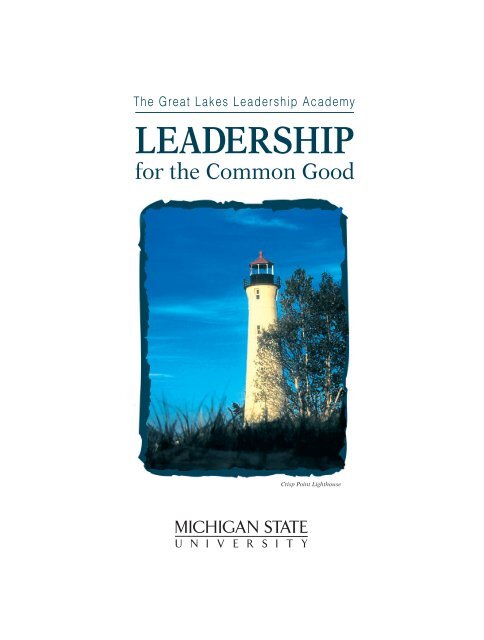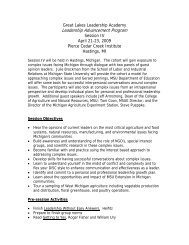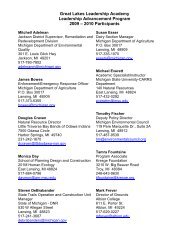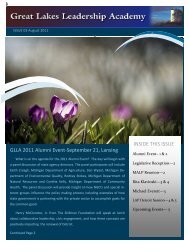2009-2010 Annual Report - Great Lakes Leadership Academy ...
2009-2010 Annual Report - Great Lakes Leadership Academy ...
2009-2010 Annual Report - Great Lakes Leadership Academy ...
You also want an ePaper? Increase the reach of your titles
YUMPU automatically turns print PDFs into web optimized ePapers that Google loves.
The <strong>Great</strong> <strong>Lakes</strong> <strong>Leadership</strong> <strong>Academy</strong><br />
LEADERSHIP<br />
for the Common Good<br />
Crisp Point Lighthouse
Creating a Legacy of <strong>Leadership</strong><br />
The value of people working together is greater than the sum of what they can accomplish alone. When<br />
power is shared and diverse voices are heard, solutions are more likely to benefit the community as a<br />
whole. This is known as leadership for the common good, and it is the aim of the <strong>Great</strong> <strong>Lakes</strong> <strong>Leadership</strong><br />
<strong>Academy</strong>.<br />
In today’s constantly changing world, leaders cannot work in a vacuum. Virtually every major public problem<br />
spills beyond the boundaries of any one sector. How can we bring people together from diverse backgrounds<br />
and sectors to tackle complex public challenges when budgets are tight and residents are skeptical of<br />
government’s ability to solve problems?<br />
Competing interests of environmental preservation, recreation, manufacturing and food production create<br />
challenges for leaders at every level. These challenges call for new ways to connect our strong agricultural,<br />
forestry and natural resources sectors with our extensive<br />
industrial and manufacturing experience, advancing a new,<br />
bio-based economy to sustain Michigan’s future. The need for<br />
enlightened leadership is critical. The <strong>Great</strong> <strong>Lakes</strong> <strong>Leadership</strong><br />
<strong>Academy</strong> seeks to find people who are willing to step forward<br />
to collaborate with others and deal with complex issues.<br />
Through GLLA I have learned to work within group<br />
dynamics, to be more flexible and adaptable in<br />
my leadership style, and I have learned to come<br />
prepared and trust in my own abilities and in others.<br />
This will allow me to work better in the future as a<br />
community organizer and activist. Michigan needs<br />
leaders now more than ever, and I plan to use these<br />
skills to benefit Michigan. — Lee Gaddies<br />
You can’t separate these three<br />
issues of land-use planning, rail<br />
transportation and energy. I intend<br />
to use my increased confidence<br />
and continue to work with my GLLA<br />
network to bridge these gaps and<br />
move forward in a way that is positive<br />
for Michigan.<br />
— Mitch Adelman
<strong>Leadership</strong> Advancement Program<br />
Many programs teach about leadership, but GLLA’s <strong>Leadership</strong> Advancement Program goes<br />
beyond the leadership theory. It teaches participants how to lead by giving them opportunities<br />
to practice their leadership skills to influence key sustainability issues. Individuals preparing for<br />
senior leadership roles learn to include others, navigate politics and find common ground among<br />
diverse perspectives. Participants learn to identify and frame issues, explore solutions and effect<br />
positive change. The program includes classroom and experiential learning, as well as in-state and<br />
international travel.<br />
Digging Deep<br />
into the Issues<br />
Participants in the advanced program<br />
get a big dose of hands-on<br />
learning that focuses on emerging<br />
issues. Issues teams create a<br />
safe environment for individuals to examine how they operate as leaders. Teams engage in difficult—and<br />
sometimes painful—conversations about key issues in an effort to learn more about<br />
themselves, their leadership styles and how to work with others.<br />
The <strong>2009</strong>-10 class formed three work teams, and each selected a critical sustainability issue facing<br />
the state. Their in-depth research included meetings with a variety of Michigan leaders and<br />
an analysis of the issue’s impact on society. Each team presented the issue to the entire class in an<br />
action-packed two-day session using their newly acquired process and consensus-building tools.<br />
I have learned that leadership is more about engaging<br />
others and learning how to listen to what they have to<br />
say, and together we can work through the issues no<br />
matter what the barriers are. — Angela Riess<br />
Without telling them “the answers” to an issue, teams gave<br />
their colleagues the tools for making informed decisions.<br />
Teams discovered that each issue is much broader, requiring<br />
more research, than individuals initially realized. Many say<br />
they arrived with a narrow view and left with a broadened<br />
perspective, grateful to have grasped the big picture. Members<br />
learned to listen to what all participants bring to the<br />
table, rather than push their own agenda.<br />
My GLLA experience has come<br />
at EXACTLY the right time for me.<br />
You have helped me practice the art<br />
of Appreciative Inquiry and to search<br />
for Common Ground.<br />
— Rob Zeldenrust<br />
1
Land Use Team<br />
Cooperative Regional<br />
Planning<br />
The land use team began with the premise that<br />
“we are not as strong individually as we are as<br />
a group.” The team learned the same is true for<br />
adjacent communities operating independently<br />
from each other trying to survive difficult<br />
economic times and achieve sustainability.<br />
There is a history of successes and failures<br />
when it comes to cooperative regional planning<br />
in Michigan. The team sought understanding<br />
of why some attempts at regional planning<br />
have succeeded and others failed and what the<br />
challenges are that must be overcome to be<br />
successful. They asked whether cooperative<br />
regional planning is a key to developing<br />
economic, social and environmentally sustainable<br />
communities.<br />
Land Use Issues Team: (L toR) Ponsella Hardaway, Roger Veliquette, Sara Pearson, Jim Bowes, Lisa Oliver-King,<br />
Steve Debrabander, Coach Brenda Alston-Mills. Not pictured — Kelly Leach.<br />
2<br />
The session led by the land use team provided<br />
opportunity to discuss the challenges facing<br />
cooperative regional planning initiatives, to hear<br />
from experts currently working in and developing<br />
cooperative regional plans across the state and<br />
to engage in a community mapping exercise. The<br />
land use team challenged the cohort to continue<br />
exploration of and become engaged in their own<br />
community’s planning efforts.
Alternative Energy Issues Team<br />
Michigan Works on Renewable Energy<br />
The alternative energy issues team<br />
researched the history of electric<br />
power generation and distribution<br />
in Michigan from the early 1900s<br />
through <strong>2009</strong>. The Clean, Renewable<br />
and Efficient Energy Act (CREEA<br />
or 2008 PA 295), along with the<br />
legislative process that resulted in<br />
that law, was examined. Research<br />
was conducted through interactions<br />
with legislators, renewable energy<br />
practitioners, entrepreneurs and state<br />
employees active in the renewable<br />
energy field, and tours of renewable<br />
energy facilities around the state. The<br />
conclusion was that the regulatory<br />
framework for providing electricity to<br />
Michigan’s citizens has not adapted<br />
at a rate sufficient to address the<br />
realities of the 21st century.<br />
Michigan has the labor, water and land resources to break existing barriers associated with the manufacture<br />
and use of renewable energy sources such as wind, solar and biomass. These and other resources provide<br />
a unique opportunity for<br />
Michigan to lead in renewable<br />
energy manufacture and use.<br />
Relaying correct information<br />
about the practicality of<br />
renewable energy, energy<br />
efficiency and the benefits<br />
thereof will result in the<br />
creation of a sustainable<br />
economy, easing our footprint<br />
on the global environment.<br />
Alternative Energy Issues Team: (L to R) Kevin Kirk, Rob Zeldenrust,<br />
Janice Schleicher, Mitch Adelman, Monica Day, Doug Craven.<br />
Not pictured — Mark Frever and Anna Sylvester.<br />
The team also concluded that<br />
collaborative leadership in<br />
renewable energy manufacture<br />
and use, when combined with<br />
energy efficiency optimization,<br />
will demonstrate how<br />
individuals, communities<br />
and other states can generate<br />
solutions for the common good.<br />
3
Rail Issues Team<br />
An Experience in Michigan<br />
Rail Transportation<br />
The rail issues team considered the general<br />
issue of transportation in Michigan. After<br />
considerable study the team came to the<br />
conclusion that Michigan would benefit<br />
from a more extensive and modern (high<br />
speed, where possible) rail system, especially<br />
one with more passenger train routes.<br />
The team developed a plan to deepen the<br />
understanding of the cohort on this issue<br />
and create a sense of excitement about rail<br />
transportation in Michigan. They provided<br />
cohort members with the opportunity to<br />
experience and reflect upon the positive<br />
and negative aspects of rail transportation<br />
in Michigan and to understand the various<br />
aspects of rail transportation from historical,<br />
current and future perspectives. The team<br />
developed an appreciation of policy and<br />
related political issues that undergird rail use<br />
in Michigan and the impacts of Michigan rail<br />
systems on economic development, land use<br />
and alternative energy, as well as social and<br />
cultural benefits.<br />
The rail team session began at the Jackson<br />
Amtrak station where the cohort boarded the<br />
train for a ride to the session in downtown<br />
Kalamazoo.<br />
A very interactive session was developed<br />
allowing GLLA participants to draw potential<br />
“desired” train routes on Michigan maps<br />
considering the best interest of the state and<br />
encouraging dialogue, listening and exchange<br />
with each other. As a result of the GLLA<br />
issues team session, one of the team members<br />
is leading similar sessions around the state.<br />
See http://michiganbyrail.org/<br />
to learn how the impact of the rail issues<br />
team continues.<br />
4<br />
Rail Issues Team: (L to R) Tamra Fountaine, Mike Everett,<br />
Tim Fischer, Roger Victory, Angela Riess, Sue Esser.<br />
Not pictured — Eric Hufnagel and Lee Gaddies, Coach Jerry Jennings.
Beyond Our Borders<br />
The capstone of the <strong>Leadership</strong><br />
Advancement Program is a two-week<br />
international experience. It’s an opportunity<br />
for participants to explore issues from a<br />
global perspective; examine leadership in<br />
the context of differing political, cultural<br />
and social challenges; view resource<br />
management in an international economy;<br />
and experience a unique networking<br />
opportunity.<br />
<strong>2009</strong>-<strong>2010</strong> <strong>Leadership</strong> Advancement<br />
Program participants pose in Spain with<br />
tools in hand at the Sierra Nevada National<br />
Park. The group assisted in creating a<br />
pathway to provide public access to<br />
a previously unreachable area of the<br />
botanical gardens.<br />
5
6<br />
A Bright Future<br />
The cohort continues the momentum by participating in an alumni network for communication<br />
and collaboration. They share ideas and develop their professional skills using social networking<br />
Internet sites, group e-mail and text messaging, in addition to more conventional methods of<br />
telephone calls, conference calls and periodic face-to-face interaction. It’s a perfect fit with the<br />
university’s commitment to lifelong learning and ongoing personal growth.<br />
I have expanded out of my smaller circle of agriculture<br />
and broadened my perspective to share and gather input,<br />
ideas and insight from the greater community. Our issues<br />
are interlinked and I will have access to this broad net-<br />
work for the rest of my life. — Roger Victory
Generous Partners in Creating<br />
a Legacy of <strong>Leadership</strong><br />
The <strong>Great</strong> <strong>Lakes</strong> <strong>Leadership</strong> <strong>Academy</strong> was developed with the aid of a planning grant from the<br />
W.K. Kellogg Foundation. The academy is conducted as a partnership of the Michigan State University<br />
College of Agriculture and Natural Resources, MSU Extension and the Michigan Agricultural Experiment<br />
Station, in cooperation with many generous stakeholders.<br />
The following have contributed financial support<br />
toward development and operation of the program:<br />
Corn Marketing Program of Michigan<br />
Edward Lowe Foundation<br />
<strong>Great</strong> <strong>Lakes</strong> Fishery Trust<br />
Greenstone Farm Credit Services<br />
Michigan Agricultural Experiment Station<br />
Michigan Department of Agriculture<br />
Michigan Department of Natural Resources and<br />
Environment<br />
Michigan Farm Bureau Family of Companies<br />
Michigan Nursery and Landscape Association<br />
MSU Extension<br />
The Nature Conservancy<br />
Tip-of-the-Mitt Watershed Council<br />
W.K. Kellogg Foundation<br />
Elizabeth Browne<br />
Mark and Jeanne Chaffin<br />
Tom and Rhonda Coon<br />
Keith and Laska Creagh<br />
Dennis and Carri Fox<br />
Jay and Cynthia Gooch<br />
Margaret Kartes Memorial<br />
Ellen Kohler<br />
Mike and Marge Kovacic<br />
Vicki Pontz<br />
William and Brenda Rustem<br />
Sandra Clarkson Stuckman and Noel Stuckman<br />
Gordon and Karen Wenk<br />
Paul and Sue Wing<br />
The following organizations provide instructors and<br />
other support to the program:<br />
American <strong>Leadership</strong> Forum<br />
Bristlecone Learning, Inc<br />
Center for Creative <strong>Leadership</strong><br />
Colflesh and Associates<br />
International Association of Programs for<br />
Agricultural <strong>Leadership</strong><br />
The Lee Institute<br />
Michigan Agricultural Experiment Station<br />
MSU Extension<br />
MSU School of Labor & Industrial Relations<br />
MSU Sustainable Michigan Endowed Project<br />
Moementum LLC<br />
Progress Associates LLC<br />
TAVA Full Circle<br />
Training Direct Inc<br />
Wavelength Inc<br />
Board of Governors<br />
Chair<br />
William Rustem<br />
Senior Vice President<br />
Public Sector Consultants<br />
Elizabeth Browne<br />
Assistant Chief<br />
Environmental Resource<br />
Management Division<br />
Michigan Dept of<br />
Natural Resources and<br />
Environment<br />
Keith Creagh<br />
Director of Industry Affairs<br />
Neogen Corporation<br />
Frank Ettawageshik,<br />
Executive Director<br />
United Tribes of Michigan<br />
Jim Howe<br />
Vice President<br />
Star of the West Milling Co<br />
Ellen Kohler<br />
Natural Resource and<br />
Environmental Attorney<br />
The Watershed Center<br />
Brigette Leach<br />
Owner Operator<br />
Avalon Farms<br />
Rodney Stokes, Chief<br />
Office of Science, Policy<br />
and Legal Services<br />
Michigan Department of<br />
Natural Resources and<br />
Environment<br />
Patty Strabbing<br />
Senior Manager<br />
Environmental Affairs<br />
Chrysler LLC<br />
Andrew Such<br />
President<br />
Enviro Policy Consultants<br />
Gordon Wenk, Chief<br />
Deputy Director<br />
Michigan Department of<br />
Agriculture<br />
Guy Williams<br />
President and CEO<br />
G.O. Williams and<br />
Associates<br />
Josh Wunsch<br />
Director<br />
Michigan Farm Bureau<br />
Dan Wyant<br />
President and COO<br />
Lowe Foundation<br />
Ex-officio member<br />
Tom Coon<br />
Director, MSU Extension<br />
7
8<br />
You Can Make a Difference<br />
We invite you to become a partner in supporting the <strong>Great</strong> <strong>Lakes</strong><br />
<strong>Leadership</strong> <strong>Academy</strong>.<br />
If you are committed to strengthening leadership for the common good,<br />
please make an investment in Michigan’s future through a tax-deductible<br />
gift. Gifts offer the benefits of membership in major MSU donor recognition<br />
societies.<br />
To learn more, go online at www.GLLA.msu.edu/giving.html, or contact<br />
Vicki Pontz at pontzv@msu.edu, (517) 432-8685.
<strong>Leadership</strong> Advancement Program <strong>2009</strong>–10 participants<br />
Mitchell Adelman<br />
District Supervisor, Michigan<br />
Department of Natural<br />
Resources and Environment<br />
Williamston<br />
James Bowes<br />
Enforcement/Emergency<br />
Response Officer, Michigan<br />
Department of Agriculture<br />
Dewitt<br />
Douglas Craven<br />
Natural Resource Director,<br />
Little Traverse Bay Band of<br />
Odawa Indians, Pellston<br />
Monica Day<br />
Research Administrator,<br />
Michigan State University<br />
Onondaga<br />
Steve DeBrabander<br />
State Trails Supervisor, Michigan<br />
Department of Natural<br />
Resources and Environment<br />
East Lansing<br />
Susan Esser<br />
Dairy Manager, Michigan<br />
Department of Agriculture<br />
Brighton<br />
Michael Everett<br />
Academic Specialist, Michigan<br />
State University<br />
Hanover<br />
Timothy Fischer<br />
Deputy Policy Director,<br />
Michigan Environmental<br />
Council<br />
Mason<br />
Tamra Fountaine<br />
Program Associate,<br />
Kresge Foundation<br />
Troy<br />
Mark Frever<br />
Director of Grounds,<br />
Albion College<br />
Jackson<br />
Lee Gaddies<br />
Commissioned artist and<br />
community activist<br />
Detroit<br />
G. Ponsella Hardaway<br />
Executive Director, MOSES<br />
Lincoln Park<br />
Eric Hufnagel<br />
Associate Director, Child and<br />
Family Services of Michigan<br />
St. Johns<br />
Kevin Kirk<br />
Special Assistant to Division<br />
Director, Michigan Department<br />
of Agriculture<br />
St. Johns<br />
Kelly Leach<br />
Farmer, Avalon Farms<br />
Climax<br />
Sara Pearson<br />
Senior Geologist, Michigan<br />
Department of Natural<br />
Resources and Environment<br />
Sparta<br />
Angela Riess<br />
Environmental Planner,<br />
Southeast Michigan Council of<br />
Governments<br />
Bloomfield Township<br />
Janice Schleicher<br />
Performance Excellence<br />
Specialist, Tri-Point<br />
Performance<br />
Mio<br />
Anna Sylvester<br />
District Parks and Recreation<br />
Manager, Michigan Department<br />
of Natural Resources<br />
and Environment<br />
Roscommon<br />
Roger Veliquette<br />
Assistant Plant Manager,<br />
<strong>Great</strong> <strong>Lakes</strong> Packing Company<br />
Kewadin<br />
Roger Victory<br />
Owner/Operator, Victory<br />
Farms<br />
Hudsonville<br />
Rob Zeldenrust<br />
General Manager, Fremont<br />
Cooperative Produce<br />
Company<br />
Fremont<br />
Cover: The lighthouse is the<br />
<strong>Great</strong> <strong>Lakes</strong> <strong>Leadership</strong> <strong>Academy</strong>’s<br />
symbol of leadership for the<br />
common good. Lighthouses have<br />
been fundamental to Michigan’s<br />
development as a state, helping<br />
shape not only its history, but also<br />
its economy. The <strong>Great</strong> <strong>Lakes</strong> State<br />
boasts more of these maritime<br />
beacons than any other state.<br />
Together, they mark Michigan’s<br />
coastline, having guided ships to<br />
safety and offered hope to lost<br />
sailors. Today they are frequented<br />
by tourists and woven into art<br />
and poetry as symbols of strength,<br />
adventure and haven in the storm.<br />
9
<strong>Great</strong> <strong>Lakes</strong> <strong>Leadership</strong> <strong>Academy</strong><br />
Michigan State University<br />
109 Agriculture Hall<br />
East Lansing, MI 48824-1039<br />
Phone: (517) 432-8685<br />
Fax: (517) 353-5406<br />
E-mail: GLLA@msu.edu<br />
Web: www.GLLA.msu.edu<br />
Grand Haven South Pierhead Lights






